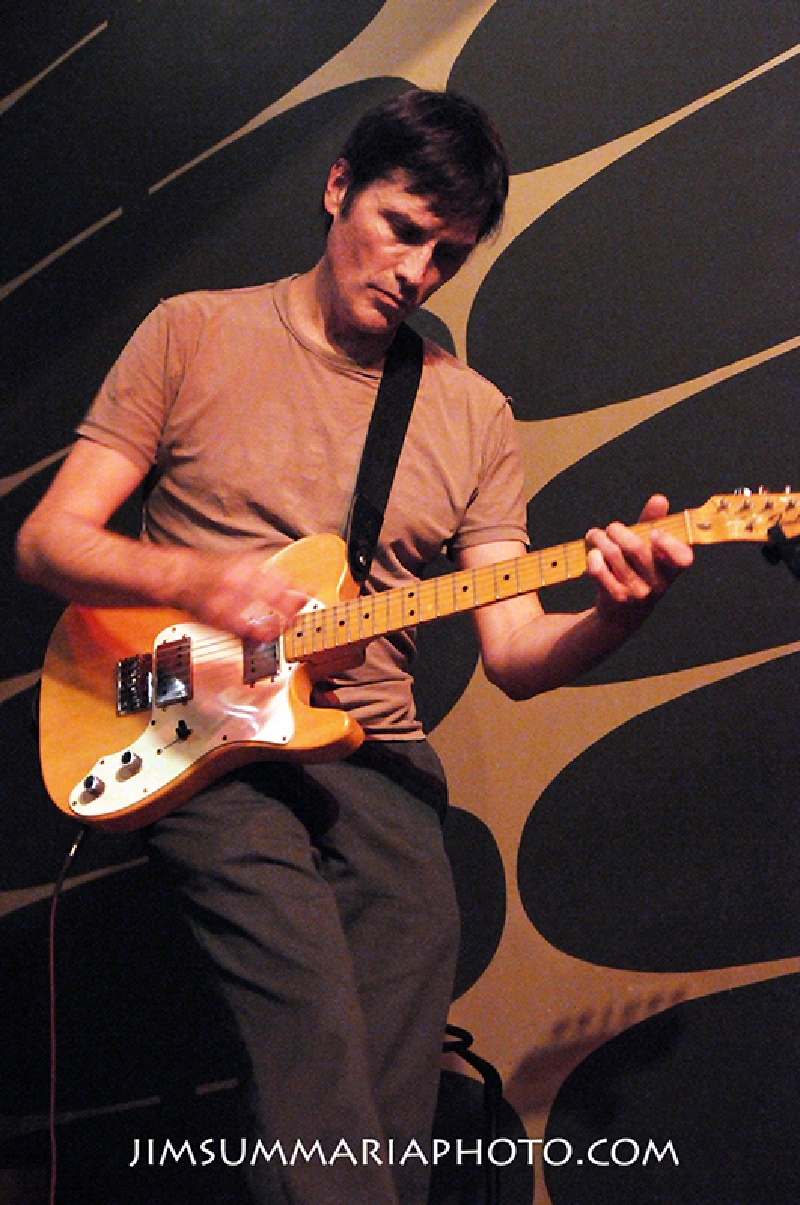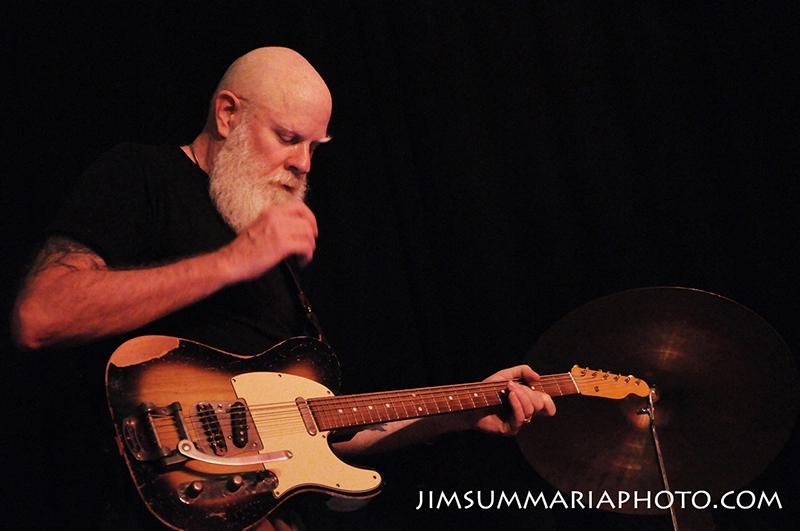Black Duck - Interview
by Lisa Torem
published: 30 / 8 / 2023

intro
Black Duck is a rising star of a band hailing from Chicago. The trio’s guitarist, Bill D. MacKay, talks to Lisa Torem about their self-titled debut, influences and songwriting.
Chicagoland mainstay figures joined forces to create the experimental, highly original Black Duck. Guitarist/bassist Douglas McCombs expanded the imagination of Pullman, Tortoise and Eleventh Day Dream. Guitarist Bill MacKay, has frequently aligned himself with Ryley Walker, Nathan Bowles and Bill Callahan. Drummer Charles Rumback, who also performed with Ryley Walker, added to the dynamite recordings of local pianist Jim Baker. Black Duck is hot, but cool. Hard-working and focused, yet amenable to change. Whatever you do, don’t do Black Duck a disservice by placing them in a conventional box. I believe, they’d fight their way out, as they should… That said, their self-titled debut is a diverse, wildly creative set of spirited instrumentals. Let your mind drift, as you would, when reciting a mantra, but if you absolutely must codify Black Duck, think: grunge, jazz, classic rock and even psychedelia. Fortunately, guitarist/bassist Bill MacKay recently stepped forward for his first pennyblackmusic interview. He’ll fill in the blanks for now. But keep an eye on Black Duck. They’re going places. PB: Your recording career, which started in the 2000s, includes solo work with Drag City, albums with Nathan Bowles and Katinka Kleijn plus two albums with Ryley Walker. Can you discuss the highlights of those sessions and how those unique professional relationships developed? BDM: Each record feels unique to me with its own high points. For my ‘Fountain Fire’ LP, it was returning to singing on a recording with ‘Try It On’ and ‘Birds of May’ that stands out now. It was also the mystery in the extended ending songs, ‘Dragon Country’ and ‘Scarlet’s Return’ on the ‘Esker’ LP. Both ‘STIR’ with Katinka and ‘Land of Plenty’ with Ryley were live recordings of new compositions, so they seem to have a special vibe and sound because it’s new songs you’re still grappling with while playing them before an audience. With ‘Keys,’ Nathan and my relationship was so new, and I think we captured a fresh moment of discovery. PB: Douglas McCombs was the bassist for Eleventh Day Dream. You played with him with that band and on other projects. Now with Black Duck, you work with McCombs and drummer Charles Rumback. What led to the development of the Black Duck configuration? At what point did you all feel that you could successfully fuse your musical tastes and talents? BDM: I met Charles Rumback at Roosevelt University, and we did several records together. I did do several gigs with Eleventh Dream Day, but really Black Duck started in about 2016 when Douglas and Charles asked me to join their improvising duo which had recently started. I think we knew right away that we had a chemistry, and my and Charles’ relationship certainly played a part in that. Our gigs for several years were improvised, and then a few years ago when discussing doing a record, we decided to mix compositions into it. PB: Discuss the songwriting on your self-titled debut album, Black Duck. How did you go about coming up with original themes? What generally comes first: the riffs, the melody, the lyrics? BDM: In my case, it happens in different ways, but often with a riff or a fragment of melody. I then return to it at intervals to see what can grow from there. It’s a mix of intuitive beginnings and sculpting or craft I think. Jackson Pollock’s painting has been an influence on me too. Once in a while you get one that kind of plays itself, or seems to pour out in a single breath. PB: Who were your major, musical influences as a guitarist? Were you self-taught or did you study formally? BDM: I had early lessons, starting at age nine and learned to read music and so on. I later studied jazz and classical guitar for a while. But I always felt self-taught. Probably because I was picking up rock and folk forms without anyone’s direction, and making up my own. I had a good ear for songs, and could learn them really fast. For guitar Jimi Hendrix, Les Paul, Chet Atkins, B.B. King, and Narciso Yepes were all huge. I got to see Roy Buchanan play several times, and that’s never left me. The Beatles’ music and guitar work were pivotal. Tina Weymouth’s bass playing on Take Me To The River was so haunting and awesome. That kind of intent and drama played a part in my thinking on guitar. Miles Davis, Chopin, Billie Holliday, Mussorgsky, Coltrane, Ravi Shankar and Dave Brubeck were right in there too, some due to my Dad. My dad was an amateur trumpeter and avid music fan. He would drive us great distances to hear big bands and all kinds of concerts. He and my mother were both influential. They had strong interests in the arts. My mother painted, mostly portraits of family friends and landscapes. Most importantly, they always encouraged me, and never spoke a negative word about my desire to be a musician. As we all know, that’s fairly rare. So, I feel grateful and lucky for that. PB: ‘Of the Lit Backyards’ combines light brushwork with sprawling guitar, culminating in a pleasant, but curious hybrid of genres. Surf icon Dick Dale came to mind, but so did early Beatles. How many takes were necessary to come up with the meditative final version? BDM: I agree there is a multi-panel vibe going on there. I love that one. That’s Douglas’s song. Really, it was probably in the first two or three takes that we got it. We had a real relaxed and energized feeling during all the sessions, so nothing required a ton of passes. We were also well-rehearsed on the songs, and our improv chemistry I felt kicked in pretty well on the other pieces. PB: There’s a dark, deep infusion of blues and classic rock on ‘Delivery.’ Did this track come about through improvisation? When you perform live, do you play it as it is on the record, or is this instrumental typically varied? BDM: Oh, ‘Delivery’ is the song I contributed to the record, and I wrote it in the two months before recording. We play it similarly to the record, though the unhinged middle section where there is a mix of me soloing with Douglas providing these huge siren or storm effects, that tends to take an original path each time. PB: ‘Foothill Daze’ is rife with alluring, electronic effects. Please identify the effects used. BDM: I would be hard pressed to know or remember! I think it is some combination of reverbs and various delays. Douglas in particular is a fan of very cool, long and spacey delays. I go more in for reverb myself. That combo makes for interesting mixtures since each guitar fills a wide part of the space, but they’re not filling it the same way, so they don’t step on each other. But yes, that song does have other effects going on. I’ll have to ask Douglas! PB: For ‘The Trees Are Dancing,’ you came up with an ebb and flow of contagious riffs. The drumming and the dynamics are equally distinctive. There’s a sense that the band is going in and out of space. Can you walk us through the decisions you made to create this track? BDM: Well, ‘The Trees Are Dancing’ is the track that Charles brought to the set. It was originally on a demo he did with acoustic guitar and a low-fi beat. There is a kind of warp or warble to it, almost like the tape itself is fluctuating. It moves along horizontally without huge shifts, but somehow is very dynamic. After hearing the demo, Douglas and I added our own bits to Charles’ melody. Then it was more a process of layering. I believe Douglas added the acoustic bass, not upright but the one like an acoustic guitar, for extra fill and depth. I dig it a lot. PB: ‘Lemon Treasure’ is, to me, the most haunting track. It banks on a balance of restraint and a fearless buildup of tensions. What has been the audience reaction? BDM: Oh, that’s been a very pleasing song to play live. Reaction has been great. We are doing a mix of songs from the record, and improvisatory tracks at the shows, and that one is our closer. So, it feels pretty cathartic. We are stretching it out and it is getting very hypnotic. Joyful really. And it feels perfect to finish with that. PB: How do you envision the future of Black Duck? BDM: We’re all very active so will continue writing, and for now we’re simply looking forward to playing the upcoming shows we have booked. It’s intoxicating for us, and hopefully for everyone who comes. That’s our aim. PB: Thank you. Photos by Jim Summaria www.jimsummaria.com
Play in YouTube:-
Picture Gallery:-

most viewed articles
current edition
Carl Ewens - David Bowie 1964 to 1982 On Track: Every Album, Every SongBathers - Photoscapes 1
Colin Blunstone - Thalia Hall, Chicago, 16/7/2025
Visor Fest - Valencia, Spain, 26/9/2025...27/9/2025
Billie Eilish - O2 Arena, London, 10/7/2025
Editorial - July 2025
Bathers - Photoscapes 2
Sir Tim Rice - Interview
Cathode Ray - Interview
John McKay - Interview
previous editions
Heavenly - P.U.N.K. Girl EPTrudie Myerscough-Harris - Interview
Beautiful South - Ten Songs That Made Me Love...
Pixies - Ten Songs That Made Me Love...
Oasis - Oasis, Earl's Court, London, 1995
Jimmy Nail - Interview
Fall - Hex Enduction Hour
Blues and Gospel Train - Manchester, 7th May 1964
Boomtown Rats - Ten Songs That Made Me Love....
Simon Heavisides - Destiny Stopped Screaming: The Life and Times of Adrian Borland
most viewed reviews
current edition
Amy Macdonald - Is This What You've Been Waiting For?Sick Man of Europe - The Sick Man of Europe
Alice Cooper - The Revenge of Alice Cooper
Phew, Erika Kobayashi,, Dieter Moebius - Radium Girls
Lucy Spraggan - Other Sides of the Moon
Blueboy - 2
Cynthia Erivo - I Forgive You
Davey Woodward - Mumbo in the Jumbo
Lapsley - I'm a Hurricane, I'm a Woman In Love
Philip Jeays - Victoria
Pennyblackmusic Regular Contributors
Adrian Janes
Amanda J. Window
Andrew Twambley
Anthony Dhanendran
Benjamin Howarth
Cila Warncke
Daniel Cressey
Darren Aston
Dastardly
Dave Goodwin
Denzil Watson
Dominic B. Simpson
Eoghan Lyng
Fiona Hutchings
Harry Sherriff
Helen Tipping
Jamie Rowland
John Clarkson
Julie Cruickshank
Kimberly Bright
Lisa Torem
Maarten Schiethart